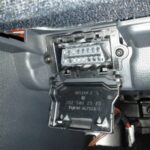When I first started diving into car maintenance, the sheer number of OBD2 scanners on the market was overwhelming. Navigating the choices between budget-friendly and high-end devices felt like a maze. Through hands-on experience, I’ve learned firsthand the differences between cheap and expensive OBD2 scanners. Let me share my journey and insights to help you decide which type of scanner best fits your needs.
Alt text: A person connecting a Foxwell OBD2 scanner to a car’s diagnostic port, illustrating the ease of use for basic car diagnostics.
My Experience with a Budget OBD2 Scanner: A Little Device with Big Surprises
I’ll never forget the day my trusty old Honda Civic’s check engine light decided to illuminate while I was miles from home on a sweltering summer afternoon. Panic started to set in, but after a quick Google search, I found myself at an auto parts store staring at a shelf of OBD2 scanners. Opting for the most affordable option, I picked up a basic $30 scanner. In that moment of potential roadside trouble, this little gadget turned out to be a lifesaver.
Plugging it into my Civic, the scanner quickly diagnosed the culprit: a loose gas cap. Who knew such a simple thing could trigger the dreaded check engine light? After tightening the cap and clearing the code with the scanner, the light vanished, and a wave of relief washed over me. I was back on the road in minutes, amazed by how this inexpensive tool had prevented a potentially stressful situation from escalating. It was an empowering introduction to the world of car diagnostics.
Discovering the Limitations of a Basic Scanner
My initial success with the cheap OBD2 scanner boosted my confidence. However, its limitations soon became apparent. When my Civic started experiencing intermittent misfires, I naturally reached for my trusty scanner, expecting another quick fix. This time, the scanner returned a generic P0300 code – “random/multiple cylinder misfire.” While it pointed to a problem, it lacked the detailed information needed for a straightforward diagnosis.
Hoping for an easy solution, I replaced the spark plugs, but the misfire persisted. Frustrated, I had to take my car to a professional mechanic. He quickly identified a faulty ignition coil as the real issue. In this instance, my cheap scanner only provided a general direction, highlighting the gap in diagnostic depth compared to professional-grade tools.
The Value of Simplicity: When a Cheap Scanner Shines
Despite its limitations, my budget OBD2 scanner proved to be an invaluable entry point into car diagnostics. It empowered me to handle minor issues independently and saved me from unnecessary trips to the mechanic for simple problems. In fact, it paid for itself several times over by preventing costly repairs for easily resolvable issues.
For someone new to car maintenance, having a cheap scanner is incredibly beneficial. It’s a reliable tool for basic diagnostics, perfect for getting quick answers and addressing common problems without breaking the bank on professional diagnostic services. It’s a fantastic confidence builder and a great first step into understanding your car’s health.
Upgrading to an Expensive OBD2 Scanner: Unlocking Advanced Diagnostics
Investing in Precision and Deeper Insights
The real turning point came when my wife’s Subaru’s check engine light illuminated. My cheap scanner, which had served me well on my Civic, drew a blank. It simply couldn’t pinpoint the problem. This frustration pushed me to invest in a more advanced scanner – the Foxwell NT809, costing around $700. This upgrade turned out to be a game-changer.
The Foxwell NT809 immediately provided real-time data and accurately identified a faulty oxygen sensor in the Subaru. This precise diagnosis not only saved me hundreds of dollars in potential mechanic fees but also allowed me to replace the sensor myself. Furthermore, this scanner offered expanded vehicle coverage and advanced diagnostic capabilities, including reading manufacturer-specific codes and performing bidirectional tests – features that were simply absent in my budget scanner.
I even learned from a professional mechanic friend how he utilizes his high-end scanner to efficiently diagnose issues across various car brands. He demonstrated bidirectional control, enabling component activation tests – something I hadn’t even considered possible with my basic scanner. The Wi-Fi updates on the Foxwell NT809 also ensured the software was always current, adding to its convenience and long-term value.
Tackling Complex Issues with Confidence
Shortly after getting the Foxwell NT809, my own car started exhibiting transmission problems. Instead of feeling overwhelmed, I confidently reached for my advanced scanner. The Foxwell provided a detailed readout of transmission-related error codes. Utilizing its live data feature, I could monitor the transmission’s performance in real-time and accurately pinpoint a failing solenoid. Again, this precise diagnosis empowered me to perform the repair myself, saving a significant amount of money and downtime.
Expanding My Automotive Knowledge
My investment in an expensive scanner did more than just fix cars; it fueled my passion for automotive knowledge. The detailed diagnostics and advanced features of the Foxwell NT809 encouraged me to delve deeper into understanding my car’s intricate systems. It transformed car maintenance from a reactive task to a learning experience, boosting my confidence and saving me money along the way.
Practical Takeaways: Cheap vs. Expensive OBD2 Scanners
Cheap OBD2 Scanner:
- Pros:
- Affordable and accessible for beginners.
- Great for quick diagnostics and simple fixes.
- Pays for itself by preventing unnecessary mechanic visits for minor issues.
- Easy to use for basic code reading and clearing.
- Cons:
- Limited diagnostic capabilities, especially for complex issues.
- May not read manufacturer-specific codes.
- Lacks advanced features like bidirectional control and live data.
- Can become insufficient as your diagnostic needs grow.
Expensive OBD2 Scanner:
- Pros:
- Comprehensive diagnostics, including manufacturer-specific codes and advanced tests.
- Bidirectional control for component testing and activation.
- Live data streaming for real-time system monitoring.
- Expanded vehicle coverage across various makes and models.
- Software updates to stay current with new vehicles and features.
- Long-term investment that can save significant money on professional repairs.
- Empowers users to tackle complex automotive issues with confidence.
- Cons:
- Higher upfront cost can be a barrier for some users.
- Steeper learning curve for utilizing advanced features.
Alt text: The Foxwell NT809 all-system car diagnostic scanner interface displayed on a screen, highlighting its comprehensive diagnostic capabilities for various vehicle systems.
Conclusion: Choosing the Right Scanner for Your Needs
Looking back on my journey, starting with a cheap OBD2 scanner was a smart move for learning the basics of car diagnostics. It served its purpose well for simple tasks and built my initial confidence. However, upgrading to an expensive scanner like the Foxwell NT809 was pivotal for unlocking deeper insights and tackling more complex automotive issues.
The choice between a cheap and expensive OBD2 scanner ultimately depends on your individual needs and level of car maintenance involvement. If you are a casual user who only needs to read and clear basic codes occasionally, a cheaper scanner will likely suffice. However, if you are serious about maintaining multiple vehicles, diagnosing a wider range of problems, and want to save money on professional repairs in the long run, investing in a high-end scanner is a worthwhile investment. Both types of scanners have their place, and understanding their strengths and limitations is key to making the right decision for your car maintenance journey.
FAQs:
What is an OBD2 scanner?
An OBD2 scanner is an electronic tool used to communicate with a vehicle’s onboard computer system. It reads diagnostic trouble codes (DTCs) to help identify potential issues within the car’s engine, transmission, and other systems.
Are expensive OBD2 scanners worth the investment?
For serious DIYers, car enthusiasts, or those maintaining multiple vehicles, expensive OBD2 scanners are often worth the investment. They offer advanced features, broader vehicle compatibility, deeper diagnostic capabilities, and can save significant money on professional mechanic fees over time.
Can a cheap OBD2 scanner perform basic diagnostics effectively?
Yes, cheap OBD2 scanners are effective for basic diagnostics. They can read and clear common trouble codes, which is sufficient for many everyday car issues like a loose gas cap or minor sensor problems. However, they lack the advanced features and depth of diagnosis offered by more expensive models.


